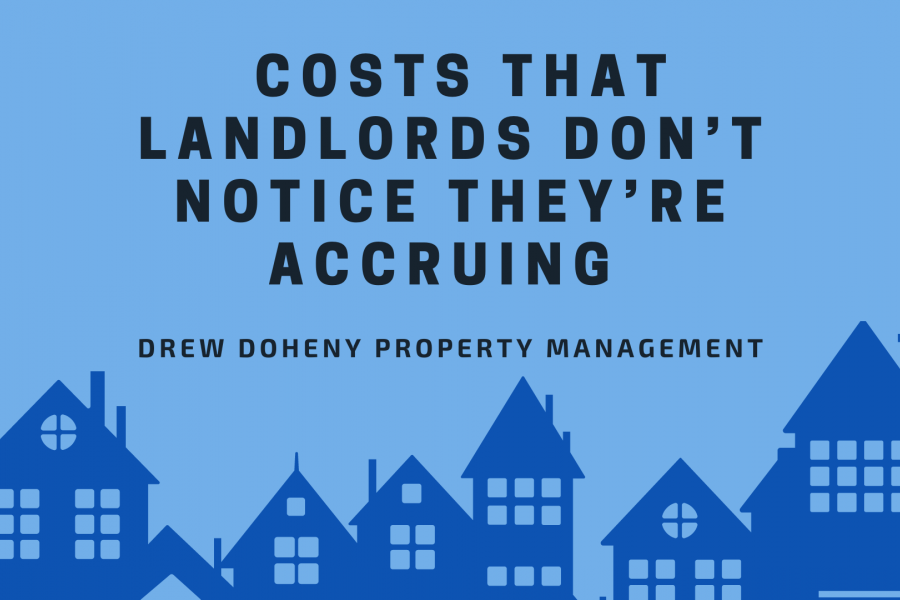
Are you a landlord who is faced with the expenses that come with investing? You have come to the right place! To be a successful landlord, it is important to ensure your costs are organized and to monitor overspending. The fewer unnecessary costs you have, the more profit you’ll be able to make.
Sometimes, though, you may find yourself overspending. This is especially true if you’re still new to the business or are busy with growing your portfolio.
In this article, Drew Doheny’s Property Management Team is here to walk you through 5 costs to keep in mind to ensure a great ROI. The goal here is to prevent unnecessary overspending and save you time, money, and stress.
Repairs and Maintenance Costs
Most landlords can agree on this – property maintenance is by far one of the most demanding jobs for a property owner. However, it is one of the most important responsibilities for protecting your investment and ensuring tenant satisfaction.
When it comes to repairs and maintenance, it is essential to be proactive in your response time. Once a tenant has notified you of an issue, make sure to respond quickly.

The longer you ignore the issue, the more serious the problem will become. For instance, a small leak in a faucet won’t be a huge expense. However, if left neglected, larger costs may come as a result. To keep maintenance costs reasonable, be proactive, respond to issues quickly, hire expert contractors, and carry out routine inspections.
Hiring a property manager for repairs and maintenance issues can ensure that repairs are promptly addressed, preventive maintenance is carried out, and reliable contractors are employed.
Legal Fees
Legal fees are an important consideration for landlords, as they can arise from various situations throughout the rental process. Having a legal partner is a good idea to help you with handling difficult legal procedures. For example, the tenant eviction process is usually difficult and costly but with the right legal partner, you can be reassured that the process will be smooth.
Be sure to ask them about their fees, as well as talk to them regularly about the services they carry out. When it comes to billings, make sure you know about things like retainer fees, and hourly charges.
Tenants
When renting out a property, it is important to find high-quality and long-term tenants. Tenants who will be responsible when it comes to paying rent, caring for the property, and reporting issues promptly.

It is essential to take your time when screening tenants. More often than not, costs related to tenants arise from the landlord’s urgency to fill vacant units as they are costly to keep running. A proper tenant screening process includes the following:
- Checking a tenant’s rental history: Call the tenant’s previous landlords to verify if the tenant respected the lease terms.
- Verifying a tenant’s employment status: Call the tenant’s employer to verify their employment status.
- Running background checks: Check whether the tenant has any eviction records.
Being thorough in the tenant screening process is necessary for optimizing your ROI. If you are not you may accumulate excess costs such as property damage, unpaid rent, and evictions. Property managers can help landlords find reliable tenants by carrying out the screening process themselves.
Vendors & Contractors
At some point as a landlord, you’ll find yourself working with professionals such as plumbers, inspectors, HVAC technicians, landscapers, and roofers. You may also need to work with legal consultants, bookkeepers, and even software partners on the business management side of things.
These services can be costly and you can easily find yourself overspending. Just as you would with tenants, make sure to screen vendors and contractors. Ask them questions regarding their professionalism, licenses, experience, and costs.

Once you have identified a great service provider, maintain a good relationship with them for future projects. Property managers can help to source these trusted service providers and can even get deals on costs and services.
Rental Vacancies
A property that sits vacant for an extended period is costly. The more the unit is unoccupied the more expenses there are to maintain it. A property’s vacancy rate will vary depending on several factors. Including the market conditions, location, and property type. Generally, a good vacancy rate falls between 2 and 7%.
If you’re experiencing lengthy vacancies, then you may want to improve its appeal on the market. Ensure you’re charging the right rent amount. Make upgrades to the property to increase its value, such as repainting it, updating the flooring, adding a kitchen backsplash, and upgrading the lighting.
Property managers can help to market your rental property effectively, attracting qualified tenants, and maximizing return on investment for landlords. Saving you from lengthy vacancies.
Conclusion
Understanding the costs associated with being a landlord is essential for effective financial planning and maximizing your ROI. From initial investment expenses to ongoing operational costs such as maintenance, legal fees, and vacant units.
The most effective solution for you could be to hire an experienced property management company to save you time, money and stress. Drew Doheny Property Management Team is a full-service property management company. We have the resources, reliability, and flexibility to meet you right where you are and optimize your ROI.
We have been able to do so for dozens of property owners across Richmond Hill, GA; we can do the same for you too. Contact us today!
